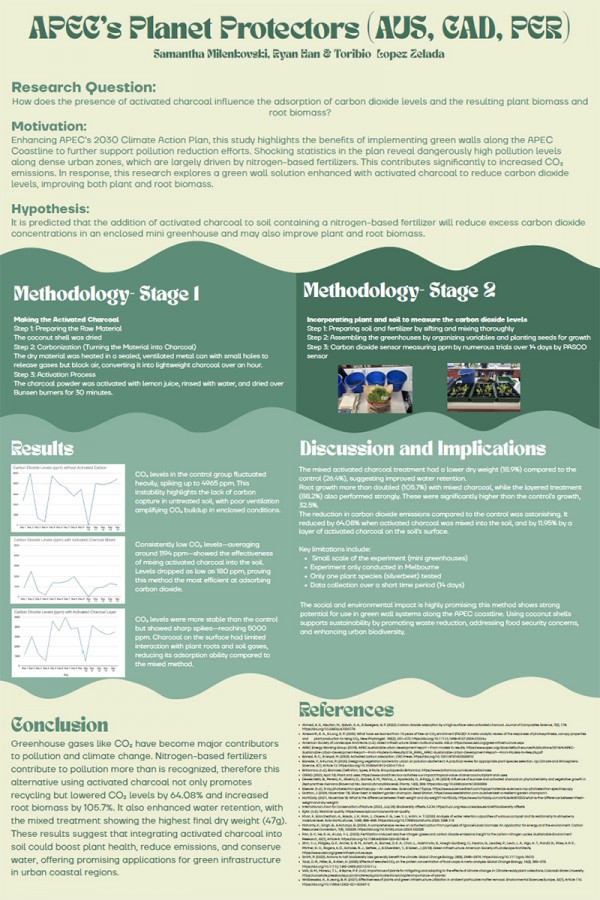|
Team : APEC's Planet Protectors Member : Samantha Milenkovski(AUS,), Ryan Han, Toribio(CAN), Lopez Zelada(PER) Mentor : Prof. Somrat Kerdsuwan Research Title : How does the presence of activated charcoal influence the adsorption of carbon dioxide levels and the resulting plant biomass and root biomass?
Research summary :
Motivation : After the discovery of APEC’s 2030 Climate Resilience Report, the team was intrigued by the absence of one of the most promising sustainable technologies: urban green walls! As the world faces alarming excess carbon dioxide levels, new innovative ways to tackle the issue are required.
Research Question : How does the presence of activated charcoal influence the absorption of carbon dioxide levels and the resulting plant biomass and root biomass?
Our Experiment: In the process of exploring eco-friendly activated charcoal products, the team came across coconut shells, a source which simultaneously reduces carbon dioxide (CO₂) levels in soil and improves plant growth. Readily available and inexpensive across much of the APEC region, coconut shells present a practical and sustainable option for broad climate adaptation efforts. We produced activated charcoal by refining, heating, and treating recycled shells. Then, we tested its impact in three mini greenhouses with different variables to simulate real-world data: one with no charcoal (control), one with charcoal-mixed soil, and one with charcoal layered on top. Silver beet seedlings were grown in each greenhouse to monitor plant growth while CO₂ levels were recorded daily.
Results : CO₂ levels in the control group peaked at 4965 ppm, demonstrating poor carbon capture in untreated soil and the effects of poor ventilation. The results showed that the charcoal mixture reduced CO₂ by an average of 64% (from around 3325 ppm in the control to a minimum of 180 ppm) and doubled root length (a 105.7% increase compared to 32.5% in the control), while the topsoil only achieved a 12% reduction in CO₂ and an 88.2% root increase. The dry weight of the charcoal-treated plants was lower than that of the control, indicating greater water retention and potential water savings.
Conclusion : Greenhouse gases like CO₂ and nitrogen fertilizers are key contributors of pollution and climate change. With CO₂ levels reduced by 64% and improved root growth by 106%, the application of activated charcoal has seen significant positive impacts. These findings confirm that the incorporation of specially blended coconut shell
activated carbon into soil effectively captures CO₂ from nitrogen fertilizers, improves rhizosphere aeration and microbial activity, and suggests a sustainable strategy for green walls and vertical gardens in the APEC region, with added benefits of agro-industrial waste valorization and urban biodiversity promotion.
Next Steps : To successfully implement green walls engineered with activated charcoal, there are several factors to be further explored. These include:
- Long-term trials under varying conditions (undertaken in various economies)
- Comparisions with alternative plant species that may have potential to thrive
- A cost-effectiveness analysis of the production of the activated charcoal and supply of coconut shells
- Collaboration with engineers to create modular systems in city infrastructure |




